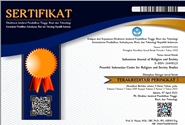Wawasan Kebersihan Lingkungan & Keberagamaan; Praktik Kebersihan Lingkungan pada Civitas Akademika UIN Imam Bonjol Padang
Abstract
The basic identity of academic community of UIN Imam Bonjol Padang is Muslim, with sufficient religious knowledge. This study aims to see the correlation of knowledge with behavior in maintaining environmental cleanliness. The research data collection was carried out by survey and in-depth interviews with the academic community of UIN Imam Bonjol. This study found that, first the understanding of the academic community of UIN Imam Bonjol Padang about cleanliness was quite good at the individual level originating from the hadith about cleanliness, both in text and in substance. Second, in maintaining cleanliness, UIN academics are influenced by the lack of available hygiene facilities and infrastructure and the absence of regulation. Third, there is an asymmetrical relationship between the knowledge of the UIN academic community about environmental hygiene and practice because the understanding of environmental hygiene is still in the domestic area and is private in nature, not yet entering the public space.
Keywords
Full Text:
PDFReferences
Abdullah, I. (2006). Konstruksi dan Reproduksi Kebudayaan (1st ed.). Yogyakarta: Pustaka Pelajar.
Agus, B. (2006). Agama Dalam Kehidupan Manusia: Pengantar Antropologi Agama. Jakarta: PT Raja Grafindo Persada.
Arditi, B. (2004). Populism as a Spectre of Democracy: A Response to Canovan. Political Studies, 52(1), 135–143. https://doi.org/10.1111/j.1467-9248.2004.00468.x
Azwar, W., & Muliono, M. (2019). Filsafat Ilmu Pengetahuan, Cara Mudah Memahami Filsafat Ilmu Pengetahuan. Jakarta: Prenada Media Group.
Bungin, B. (2007). Penelitian Kualitatif. Jakarta: Kencana Prenada Media Group.
Efendy, I. (2018). Konstruksi Pendidikan Kesehatan Lingkungan Dalam Perspektif Islam. MIQOT: Jurnal Ilmu-Ilmu Keislaman, 40(2). https://doi.org/10.30821/miqot.v40i2.305
Farmer, M. A., Trapnell, P. D., & Meston, C. M. (2009). The Relation Between Sexual Behavior and Religiosity Subtypes: A Test of the Secularization Hypothesis. Archives of Sexual Behavior, 38(5), 852–865. https://doi.org/10.1007/s10508-008-9407-0
Firdaus, F. (2012). Puar Cama Untuk Anak Cucu: Kearifan Lokal Untuk Sustainability Forest di Manggarai Barat. Jurnal Ilmu Sosial Mamangan, 1(1), 39–50.
Kahmad, D. (2009). Sosiologi Agama. Bandung: PT Remaja Rosdakarya.
Maliki, Z. (2011). Agama dan Lingkungan Hidup, 14(1), 137–147.
Nora, L., & Minarti, N. S. (2016). The Role of Religiosity, Lifestyle, Attitude As Determinant Purchase Intention. In The 2nd International Multidisciplinary Conference 2016 (pp. 135–148). Universitas Muhammadiyah Jakarta.
Ritzer, G., & Goodman, D. J. (2010). Teori Sosiologi: Dari Teori Klasik Sampai Perkembangan Mutakhir Teori Sosial Posmodern. Yogyakarta: Kreasi Wacana.
Swim, J. K., Stern, P. C., Doherty, T. J., Clayton, S., Reser, J. P., Weber, E. U., … Howard, G. S. (2011). Psychology’s Contributions to Understanding and Addressing Global Climate Change. American Psychologist, 66(4), 241–250. https://doi.org/10.1037/a0023220
Syahputra, I. (2016). Agama di Era Media: Kode Religius dalam Industri Televisi Indonesia. Esensia, 1(17), 125–138.
DOI: https://doi.org/10.36256/ijrs.v1i1.8
Refbacks
- There are currently no refbacks.
Copyright (c) 2019 Indonesian Journal of Religion and Society

This work is licensed under a Creative Commons Attribution-NonCommercial 4.0 International License.
Indonesian Journal of Religion and Society (IJRS) Is Indexed By:

Indonesian Journal of Religion and Society (IJRS) is distribute under Creative Commons Attribution-NonCommercial 4.0 International License.













